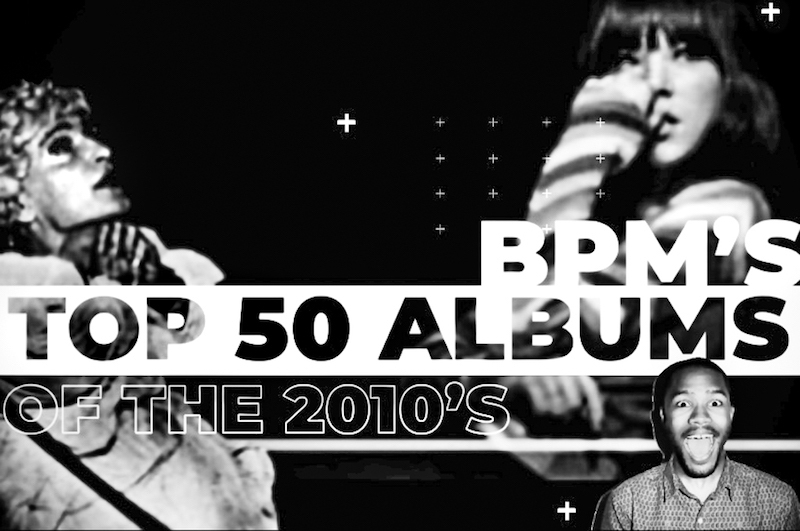Listen to a Spotify playlist of our favorite tracks from BPM’s Top 50 Albums of the 2010s
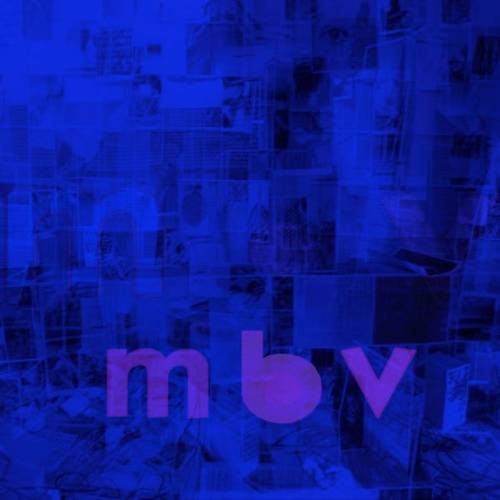
20.
My Bloody Valentine – m b v
[m b v; 2013]
“How does one follow-up Loveless?” is the question that plagued Kevin Shields every night for 22 years. The shoegaze classic dropped in 1991 after a two-year long recording process that nearly bankrupted Creation Records, and a follow-up always seemed imminent, but various reasons for delay crept up over the years. Repeated break-ups, several reunions, the death of shoegaze in the mid-to-late 90s, and of course Shields’ own demons kept the prospect of a new album on the shelf. In fact, it became a joke of sorts, mentioned in passing along with Chinese Democracy and Detox.
And then… it happened. No one believed him. No one took his teasing as seriously. No one actually thought that on February 2, 2013 we would be listening collectively to a new My Bloody Valentine record.
I was up late that night, when news broke. “It’s here! It’s here!” my friends exclaimed. I didn’t believe them. My first experience with m b v came via a message board play-by-play, as a friend on the other side of the country was losing himself in “Only Tomorrow” whilst drowning himself in a box of wine: m b v was here.
If I could, I would relive Groundhog Day 2013. To hear “She Found Now” for the first time again would be like hearing Loveless for the first time again – especially as we didn’t know what a red herring that was too. “She Found Now” was the perfect way to open the album, satiating longtime fans who had clamored, starved, and bled for the release of this album for over two decades. But, as m b v progresses, it transforms into a whole new beast.
As it would appear, we are reliving that same scenario in 2021. When Loveless was reissued earlier this year, and most of the catalog uploaded to streaming services for the first time globally, Shields implied new music was on the way – but that was only like the hundredth time he’d said that same thing. In a perfect world though there is no need for a follow-up. What every shoegaze fan wanted was to just hear where Loveless was going to take them next, and m b v did that. – Tim Sentz

19.
Grouper – Ruins
[kranky; 2014]
One of the most delicate albums of the 2010s — so much so that it threatens to break and dissolve at any moment — Liz Harris’s 10th record as Grouper, Ruins, stands out for several reasons. One is that Harris, who had previously released a lot of material cloaked in echo and layers of effects, was finally inching closer to the spotlight of her own music. This is, admittedly, something she had flirted with before, but never before was Harris so heard, so seen.
With little more than piano, a tape recorder, and her voice, Harris crafted an album so full of pain and sadness that it can be difficult to listen to at times. It’s as if we are hearing voice memo diaries she made for herself.
Hearing her lyrics in sharper relief than ever before lent her work an even stronger gravity. When Harris sings lines like “Can’t you see I’m fading / Soon there won’t be anyone there,” or “It’s in the morning when the sadness comes,” it’s startling in its blunt honesty. And yet, we never wish for her voice and her words to go back into the moonlit obscurity of her older work; on the contrary, hearing this enigmatic, unpredictable artist deepening her sound, making the kind of music that seems both unassuming and yet unlike anyone else’s, is thrilling.
Harris’s soft, emotive coo, and cyclical pianos — bookended by two ambient pieces, and rife with field recordings of thunder and frogs from the Portugal countryside where she recorded — is all we need to feel it. Simpler, more direct, and more powerful than anything Harris had released previously, Ruins is truly one of the most stunning, and most insular, albums of the decade. – Jeremy J. Fisette
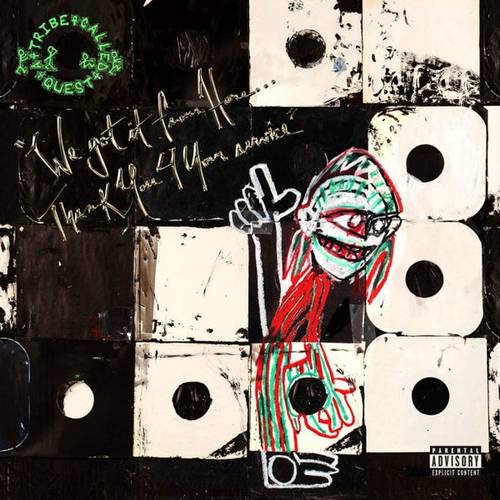
18.
A Tribe Called Quest – We Got It From Here… Thank You 4 Your Service
[Epic; 2016]
If you believe Q-Tip, Jimmy Fallon is the reason We Got It From Here… even exists. After 1998’sThe Love Movement capped off an incredible run, A Tribe Called Quest exited the building, and while rumors surfaced that there was a new record, it wasn’t until that night on Fallon that the album came to fruition. So Jimmy Fallon can take credit for one of the greatest rap albums of the decade. Well… some credit. The album didn’t come until a year after that performance – and after Phife Dawg sadly passed away in March of 2016 from diabetes.
The steps taken to get We Got It From Here.. out into the open are harrowing, given Phife’s health and travelling schedule. But together, Q-Tip and Phife recorded enough to make a whole album, something neither of them thought possible. It’s not even a continuation of The Love Movement, nor is it a rehash of The Low End Theory. The final Tribe album is wholly unique and exists in its own space. It continues the themes and conscious rap ideas that the group brought to the mainstream in the early 90s, and their promotion of equality resonated so much more in the wake of the 2016 Presidential Election.
Early on in the album, “We The People” cements itself as the anthem most impactful – “All you black folks you must go / All you Mexicans, you must go / And all you poor folks, you must go / Muslims and gays, boy we hate your ways / So all you bad folks, you must go,” Q-Tip’s hook lobs a fiery Molotov at the United States political system. The album maintains that same heat throughout its hour-long run.
Just like its predecessors, We Got It From Here is a labor of love, brought to life by a host of stellar cast members ranging from Kendrick Lamar and Andre 3000 to Anderson .Paak and Jack White. And, just like the rest of their albums, it still slaps years later. It’s the perfect swan song for one of hip-hop’s best and most important acts. – Tim Sentz

17.
St. Vincent – Strange Mercy
[4AD; 2011]
It’s interesting to think of now, but Annie Clark wasn’t always one of indie rock’s shining stars. Nowadays, nearly every move she makes is a news item; her albums feature long rollouts and orchestrated visuals; she even has a sort-of-mockumentary movie starring her and Carrie Brownstein as ‘versions’ of themselves coming out soon. So, it’s maybe a bit surprising that before the 2010s, this was not the case.
Strange Mercy, St. Vincent‘s brilliant third album, marked the start of a major shift in her career. Having already proven herself as a kind of quirky but talented songwriter on her first two records of loungey and watercolor indie pop with the occasional rock edge, her third effort showed Clark arriving at the height of her powers. Her guitar work, which she’s now rightfully known for, was on sparkling display, coming off sometimes like intergalactic lasers, other times like crushing walls of distortion, and sometimes as soft as velvet. Tracks like “Cruel” are bouncy and fleet-footed, while others like “Surgeon” or “Neutered Fruit” are more spaced-out affairs. The title track is a surprisingly emotional ballad, and “Dilettante” featured a swaggering groove with a climactic outro.
There was such versatility on Strange Mercy, and yet it still managed to be so clearly the distinct voice of its creator. Say what you will of her later output, but Strange Mercy is one of the tightest and most impressive indie rock albums of the decade, made by a star right as she was becoming one. – Jeremy Fisette
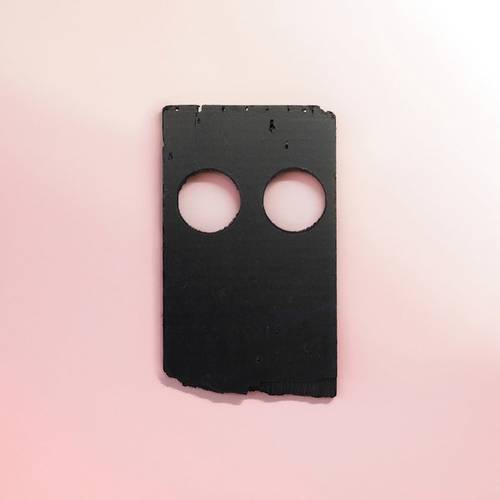
16.
Low – Double Negative
[Sub Pop; 2018]
“Everybody says the war is over / It isn’t something you forget so easy”, Low’s Alan Sparhawk sings on “Always Trying To Work It Out”, his voice drenched in a delirium of sound effects. Three years after the release of Double Negative, the ripple effects of its festering peak-Trump era noise transmutations are still felt today. Arguably like no other album, it captured the confusion and chaos of a time where sharp divides and hopelessness felt more rife than ever.
There is no sense of place on Double Negative: everything has been cranked to a static-laden, alienated abstraction, including the crisp vocal harmonies Sparhawk and Mimi Parker have made so fundamental to their recordings. So many records have explicitly tried to capture a certain zeitgeist, but Double Negative is a record that homes in on it viscerally and by osmosis: both in its words and its tectonic, abrasive sonics. It also marked a radical shift in direction that’s so often lauded in the realm of pop music: Double Negative holds up as a pinnacle of reinvention in the same category as a Loveless, a Kid A or Spirit Of Eden. – Jasper Willems

15.
Björk – Vulnicura
[One Little Independent; 2015]
Even though nothing but her face is exposed on the cover of Vulnicura, the latex suit Björk is wearing leaves little to the imagination; she’s more skeletal than anything else. In the middle of her chest is an undefinable pattern that looks both like a gaping wound or a vagina – both descriptions fit. Vulnicura is an album that exposes her wounds, Björk detailing the grief and heartbreak of her separation from artist Matthew Barney. But this is also an album that is about what it is to be a woman, both in this devastating emotional situation and in the world itself.
Details of her breakup are explicit, from self-doubt (“Did I love you too much?”) to the last sexual experience (“Every single fuck we had together / is in a wondrous time lapse / with us here at this moment”). Words are sung like plasters being slowly peeled off wounds, each one a considered movement and deliberate action to express and relieve (or should that be “relive”?).
Björk’s arrangements are heavy, slow, and not always melodical; sometimes the songs on Vulnicura have more in common with late Scott Walker albums than they do with anything from Björk’s own back catalogue. The 10-minute centerpiece “Black Lake” is punctuated subtly by long, drawn-out, held notes, like thick tar trickling down a wall. On “Atom Dance” the pizzicato arpeggio bobs the track up and down and back and forth, like it’s caught on the ocean Björk sings about. While the darkness might lift here and there, it’s still imbued in everything across the album (likely something to do with her co-producers The Haxan Cloak and Arca).
Emotional wounds are ones that we always wear, and for Björk, laying them out on the table sounds like part of the healing process; Vulnicura might be a demanding and exposing album, but it’s also an important, and even now, still a relevant one. Even for those of us lucky enough not able to empathize with her, Vulnicura is still undeniably affecting. – Ray Finlayson

14.
Perfume Genius – No Shape
[Matador; 2017]
Having a body fucking sucks, man. So many hours are devoted to caring for our corporal form: watering it, feeding it, resting it.
Mike Hadreas is painfully aware of his body. He’s lived with Crohn’s and addiction for much of his life, two conditions that threaten to ruin you. He’s also queer, dealing with physical desires and a historical threat of disease that have been demonized by the mainstream.
On his fourth album as Perfume Genius, Hadreas explored what it might mean to have No Shape, to not exist at all, to “break free” from our bodies. He paired these ideas with the most visceral music he’d ever made, full of crushing walls of champagne noise (“Otherside”), delicate waltzes (“Valley”), and rollicking drums that might make you yell ‘it’s in the trees! It’s coming!‘ (“Slip Away”).
If Kate Bush is the patron saint, then Prince is the DJ and Fiona Apple is out back smoking a cig. But for all these high-concept art-pop trappings, it’s Hadreas’ words that cut the deepest. On the closing track “Alan”, an ode to his longtime partner, he sings “I’m here, how weird.” To rest easy, to feel safe, to be happy: it can all feel so natural. Huh. – Ben Cohn

13.
Owen Pallett – Heartland
[Domino; 2010]
“This place is a narrative mess.” Don’t trust (or tryst with) Owen Pallett though, as they’re something of an unreliable narrator, exploring power dynamics, anger and frustration, and one’s place in the world on their exemplary album Heartland. There are forums and think pieces ready to be filled with lyrical analysis, tracking the album’s main characters (a “young, ultra-violent farmer” named Lewis and their commanding, all-powerful creator Owen) and how it begins the journey that Pallett would expand upon and explore in his subsequent releases.
A fact though: Heartland doesn’t need you to understand the story to have you enjoy it. The sly, smirk of “Oh Heartland, Up Yours!” or the thundering timpani of “Red Sun No. 5” are opulent and delicious moments in themselves. “I’m never gonna give it to you” is a mantra you’ll cry and bellow in your own life, taken from its dazzling, fizzy chamber pop context on the album.
Inference and any “real” meaning also sit to the side against the majestic orchestral arrangements (brought to life by the Czech Philharmonic and the St. Kitts’ Winds ensemble); strings soar and swell, woodwinds flutters and chime, and together with Pallett’s yearning vocals, you have an album that has appeal to both classically-inclined ears and those looking for a feverish pop hook. Who’d have thought a narrative mess could be so neat? – Ray Finlayson

12.
Janelle Monáe – The ArchAndroid
[Bad Boy/Atlantic; 2010]
Ambitious. That’s the only way to describe Janelle Monáe’s debut LP The ArchAndroid.
The album opens with “Suite II Overture”, a sweeping orchestral number that signals elegance and theatrics. But make no mistake: Monáe ensures no genre is off-limits. The album is funky one moment (the Big Boy assisted “Tightrope”) and trippy the next (“Mushrooms & Roses”) – the intimate ballad “57821” even recalls Simon & Garfunkel’s take on “Scarborough Fair”.
Nevertheless, these 18 songs foreshadow and speak to each other. Notice, for example, how the guitar riff introduced over Saul Williams’ voice on “Dance or Die” becomes the centerpiece of “Faster”. Details like these keep the album focused, something akin to watching the funkiest tightrope act. To borrow a more contemporary phrasing, The ArchAndroid slaps.
Yet, remember that The ArchAndroid is a sci-fi concept album. Monáe takes us through the second and third parts of her Metropolis series (the first being her 2009 EP), the story of Cindi Mayweather, an android who’s traveled in time to free the citizens of Metropolis. One great advantage of sci-fi is the ability to disguise the problems of the day through different settings – an opportunity Monáe takes throughout the album. “Cold War” funnels the issues of marginalization through the otherness of Mayweather (“I was made to believe there’s something wrong with me”). “This is a cold war / Do you know what you’re fighting for?” Monáe declares again and again, making clear that when it comes to liberation, there’s never an excuse to wait.
All of this is to say The ArchAndroid is both of its time – see Of Montreal’s feature on ‘”Make The Bus” – and timeless – the following “Wondaland” is a glistening song where Monáe’s voice sounds as precious as porcelain. Way back at the start of the decade, Monáe created an otherworldly modern masterpiece. – Carlo Thomas
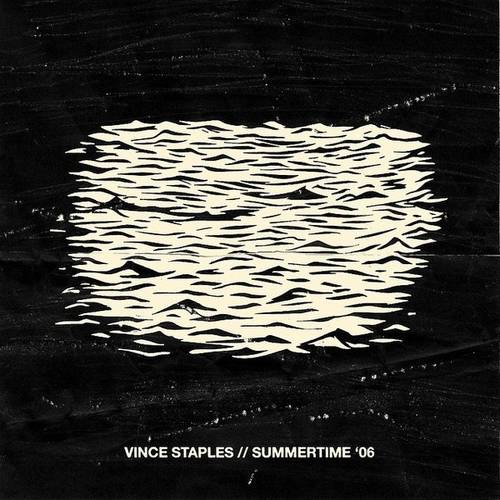
11.
Vince Staples – Summertime ‘06
[Def Jam; 2015]
You’d have to be seriously nuts to release your debut album as a double album, and even crazier to use an iconic album cover (albeit reinterpreted). But Vince Staples did just that in 2015 with Summertime ‘06, which is not only an incredible rap album, but also one of the strongest debut albums of the decade.
Even at just under an hour, Staples’ debut never feels bloated. Summertime ’06 stays true to its name – it breezes by as Staples casually projects a string of brutal statements via his impeccable lyricism.
It’s those same lyrics that made him a target for the likes of Fox News and YouTube moms, demanding heavy censorship of the rapper’s more direct offenses. Perhaps they had ad a problem with thumper “Norf Norf”, where he spits “Folks need Porsches / hoes need abortions.” Staples isn’t bothered. They won’t phase him.
This isn’t to imply that Summertime ‘06 is just a laugh riot to get boomers to hide under their Rascals. Staples shows the very real consequences of his life too, giving an honest and brutal depiction of life for a black man living in Compton. Album highlight “Jump Off the Roof” finds a couple struggling with cocaine addiction, and the memorable bridge from Snoh Aalegra goes right for the heart, begging him to stay with her instead of his drug; “If I told you that I love you, would you care? / If I said I need you would you be right there?”
In 2015, colossal releases from Kendrick Lamar and Drake might have put him in the shade, but with Summertime ’06 he carved out a fine slice of realism that no one else could have – and it’s ensured the album’s long-standing renown. – Tim Sentz

